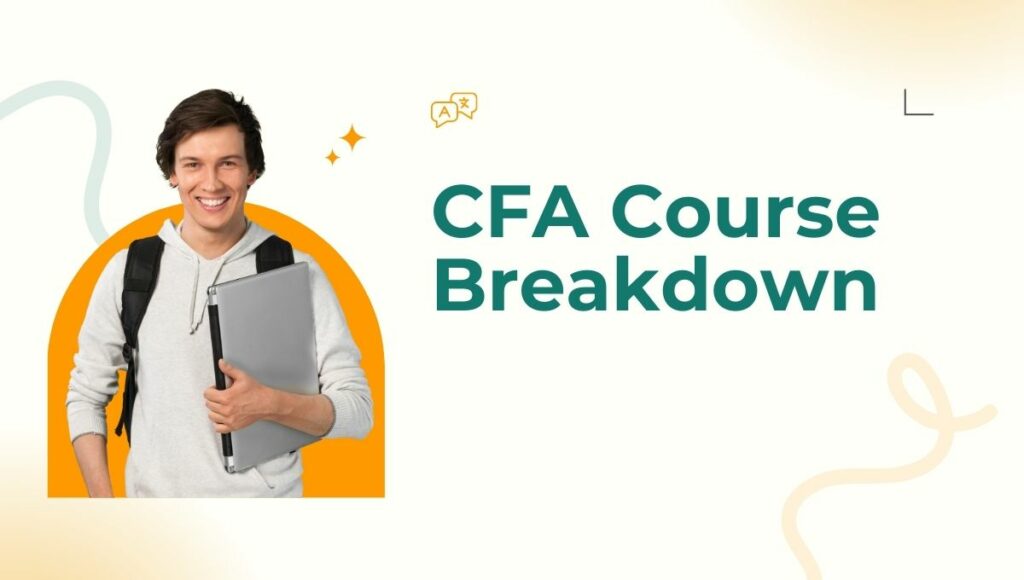Chartered Financial Analyst (CFA) is one of the most coveted certification courses in finance and investment. Designed to enhance investment analysis, financial management, and risk management abilities, the CFA program is extensively accepted by worldwide financial institutions.
If you also want to follow the CFA program, this book will provide you with a detailed CFA curriculum analysis, study schedule, CFA exam format, and CFA course length analysis so that you can succeed through the program.
What is the CFA Course?
CFA course is a worldwide recognized programme of the CFA Institute. The course focuses on preparing those professionals who are going to carve out careers as investment managers, financial analysts, and asset managers.
Why Pursue the CFA Course?
- Global recognition within finance and investment sectors
- Higher demand for asset management, risk assessment, and investment banking
- Improved compensation package for CFA charter holders
- Full training on portfolio management and financial analysis
CFA course length ranges from 2.5 to 4 years depending on the candidate’s learning pace and performance at three levels of exams.
CFA Exam Pattern and Levels
CFA exam consists of three levels, which span different types of investment and finance knowledge. Details about CFA exam pattern are extremely important to study in an orderly way.
CFA Level I:
- Emphasis: Finance basic concepts, ethics guidelines, and quantitative techniques
- Format: 180 multiple-choice questions over two sessions (2 hours 15 minutes each session)
- Key Topics: Economics, financial reporting, equity investments, derivatives
CFA Level II:
- Focus: Advanced investment analysis, asset valuations, portfolio management
- Format: 22 item sets (88 multiple-choice questions)
- Key Topics: Fixed income, alternative investments, corporate finance
CFA Level III:
- Focus: Portfolio management and wealth planning
- Format: Essay questions (structured response) and item set questions
- Major Subjects: Behavioural finance, risk management, performance measurement
The CFA exam is conducted in February, May, August, and November, which is preferable to the applicants to choose examination dates.
CFA Curriculum: Subject-Wise Breakdown
The CFA curriculum consists of ten broad subjects that are addressed in all three levels.
Core Topics in the CFA Course:
- Ethical and Professional Standards
- Quantitative Methods
- Economics
- Financial Reporting and Analysis
- Corporate Finance
- Equity Investments
- Fixed Income
- Derivatives
- Alternative Investments
- Portfolio Management and Wealth Planning
Each level of the CFA course builds on these basics, with increasing complexity as one progresses higher.
CFA Study Plan: How to Prepare Effectively
To pass the CFA course, one needs an effective CFA study plan. Read the following step-by-step guide on how to prepare effectively.
Step-by-Step CFA Study Plan:
1. Understand the CFA Exam Pattern
- Get familiar with the pattern of the exam, the duration, and the types of questions.
- Practice past exams to understand the level of difficulty.
2. Create a Study Schedule
- Utilize 300-350 study hours per exam level.
- Create day-to-day and week-to-week study goals.
- Focus on high-weightage topics like ethics, equity, and fixed income.
3. Use CFA Study Materials
- Attend CFA prep courses for systematic learning.
- Use CFA-approved books and practice papers.
- Use online resources and forums for clearing doubts.
4. Take Mock Tests and Practice Questions
- Practice at least 5 complete-length mock tests before the real test.
- Practice weak areas and go through errors.
5. Revise and Strengthen Weak Areas
- Use the last month to go through and reinforce concepts.
- Flashcards and concept overview notes must be utilized in the process of quick review.
Best CFA Exam Resources
Maximum CFA exam study can be achieved only by using best-class materials. Some of the best CFA exam materials are as follows:
1. CFA Institute Official Curriculum
Provides elaborate explanations of concepts
Provides practice questions and mock tests
2. Kaplan Schweser CFA Prep Books
Splits tough topics in easy words
Provides massive question banks along with study guides
3. Wiley CFA Exam Review
Provides practice tests along with practice quizzes in interactive learning modules
Adaptive learning capabilities driven by AI
4. Bloomberg CFA Study Materials
Provides web-based guidance along with a study guide
Topic-based practice tests
Using these CFA exam resources will ensure an effective preparation plan.
FAQs
- How long does it take to finish the CFA course?
The CFA course takes 2.5 to 4 years, depending on the candidate’s study pace and passing of exams.
- How many hours of study are required for a level of CFA?
300-350 hours of study for each level of study is optimal for preparation.
- Can one try CFA Level I without work experience?
Yes, CFA Level I is independent of work experience, but four years of work experience are needed to earn the CFA charter.
- What is the passing percentage of the CFA exam?
The pass percentages of the CFA exam vary, but typically:
Level I: 35-45%
Level II: 40-50%
Level III: 50-55%
- Which CFA level is the most difficult?
The most challenging is CFA Level II because it has complex valuation techniques and a lot of focus on finance concepts.
- Is it possible to self-study for the CFA exam?
Yes, the majority of candidates pass by self-study with CFA-recommended books, but passing by going through a prep course can be a huge difference.
- What are the advantages of studying the CFA course for career?
CFA charter holders are very much sought after in investment banking, asset management, risk analysis, and portfolio management roles.
Conclusion
CFA course finally leads to financially rewarding investment and finance careers. Proper CFA study plan, familiarity with CFA curriculum, and proper CFA study material will go a long way toward increased chances for success.
Whether you’re beginning at Level I or getting ready for Level III, commitment and a systematic approach will guarantee success on the CFA exam. If you’re ready to elevate your finance career to the next level, begin preparing for your CFA course now!

